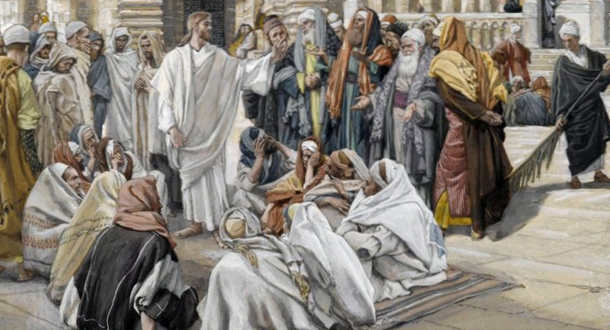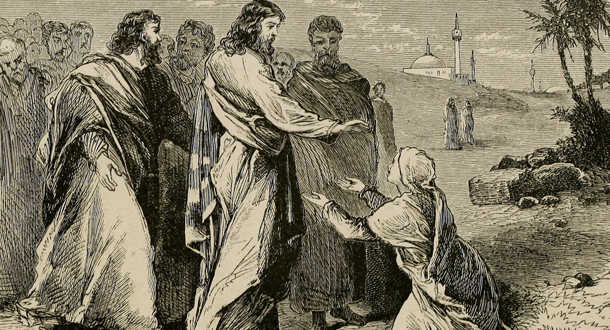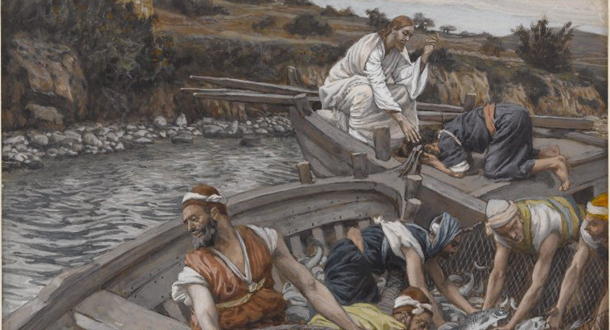View the videos below:
English
English with Spanish subtitles
 Scripture:
Scripture:
Reflection:
In his letter to the Corinthians St. Paul tells us, “Let all that you do be done with love.” What a great thought for Valentine’s Day. Most of us have grown up thinking of this day as a day for expressing friendship with little heart-covered valentines and, if we are lucky, even heart-shaped pieces of candy with little messages on them that don’t really matter as much as the flavor! And for some, Valentine’s Day is a chance to share heartfelt sentiments that might never be expressed otherwise, at least not with such passion and romance. Yet, the origin of this special day actually goes back to early Roman times when a young soldier name Valentine was jailed for protesting the Emperor’s decree that young men were to be soldiers and not allowed to marry. Other sources say that this day is attributed to the actions of a man, again named Valentine, who helped Christians escape from prison. And still others say that there was a man named Valentine who sent a greeting to those he loved from prison and hence, the first Valentine! One thing is for sure, February 14th is a day where one and all are invited to reflect on the meaning of love in their lives, whether that love is prompted by divine grace or human affection. When we think about it, no one can really live without love. How fitting, then, that we dedicate a day when we not only think about love in our life but actually reach out and tell others that we love them, as well. Charles Schultz, the famed creator of Snoopy, Charlie Brown, and lovely Lucy, summed it all up by saying, “All you need is love. But a little chocolate now and then doesn’t hurt.”
Our first reading, taken from the creation account in the book of Genesis, captures the thoughtful kindness of our God as God creates the first man, Adam, and a loving partner, Eve. Adam is the word given for humankind; Eve (Eva) signifies that she is the mother of humankind. How well God knew and loved all of creation, desiring from the very beginning of time, that we would not be alone but would know love, God’s love, personally and through one another. In the passage from Mark’s Gospel we see love overflowing from the heart of Jesus himself as he responds to the mother’s desperate plea that her daughter be cured from the grasp of a terrible demon. How I would love to have witnessed this encounter between the mother, a “foreigner” as the scriptures tell us, whose love was absolutely selfless, as she unhesitatingly cries out to Jesus who was trying so hard to enter the home without even being noticed! Nothing could stop her; nothing could hold her back so great was her love.
On this day, then, St. Valentine’s Day, we celebrate love, human and divine. While we enjoy the candies and little messages on pieces of colored paper, perhaps we can also remember the invitation of St. Paul who, once again, reminds us to let everything that we do be done with love. Happy Valentine’s Day!
Fr. Pat Brennan, C.P. is the director of Saint Paul of the Cross Passionist Retreat and Conference Center, Detroit, Michigan.
 Scripture:
Scripture:
Genesis 2:4b-9, 15-17
Mark 7:14-23
Reflection:
Have you ever been tempted to assume you understand the message of a familiar Gospel? A default sort of subconscious way of categorizing—neatly—what we think the message says. Today’s text is that kind of example for me. I have usually assumed that Jesus is calling out or criticizing the Pharisees for their hypocritical judgements; “don’t be so preoccupied with outward appearances but rather be sure you’re keeping your heart clean or pure.” I might suggest we’ve often experienced people in our own world who seem preoccupied with judging others and I used to think—those people need to hear this! Yet, Scripture is the living word and if I’m not listening deeply to new ways of understanding the text where is the life in that? Where is the growth?
More recently, I’ve been looking at this through the frame of the Pharisees, and I feel an empathy for their challenge and struggle. Its as if suddenly their purity laws are up for debate; what about their martyrs who died rather than eat unclean food? Is Jesus saying they died for nothing? That would be hard to accept and very confusing for his audience. So, what does Mark want his first audience to understand?
Much has been written about the early struggles of the church. The Apostle Paul addresses these issues in many of his letters; the blending of Gentile and Jewish cultures was a huge challenge. Our clue comes from the very next section of this Gospel—The Syrophoenician Woman who challenges Jesus to give her the crumbs from the table of the chosen people (7:24-29). Might it be possible here that Mark has Jesus speaking to the early Jewish Christians about inclusion of the Gentiles?
Therefore, the conversation about all foods being declared clean (v. 19) indicates the current reality of the early church. Paul takes this up in his letters to the Corinthians and Galatians. Jesus is the wholeness, the fulfillment of the Covenant with Israel, the purity laws were only guideposts leading to him. They were good and useful but not today. Now we press on with Metanoia—the changed mind; the Mind of Christ. We look to the person of Jesus and how he taught his disciples and the crowds. We are not far from the kingdom when we help our neighbor, not for personal glorification but with a humble desire to care for the other.
Jesus suggests, nothing that enters from the outside can defile that person; but the things that come out from within are what defile (v.15, 16). In the first reading from Genesis; commonly understood to be the second story of creation where God makes man first before all the animals and puts them in a garden. The story speaks of a loving engaged Father who walks with us in the cool of the evening. This is a God who desires a relationship with us. This is a God who disturbs me –like the Pharisees—when I need to include those who are different from me. God desires for us to work towards unity. Jesus himself prays the prayer for unity, “so that they may all be one, as you Father, are in me and I in you..” (John 17:21)
Where have I encountered the stranger this day? This may even be a family member.
Who are the people you are being called to include?
Jean Bowler is a retreatant at Mater Dolorosa Passionist Retreat Center in Sierra Madre, California, and a member of the Office of Mission Effectiveness Board of Holy Cross Province.
 Scripture:
Scripture:
Reflection:
“God saw all that he had made, and it was very good.” ~Genesis 1:31
That can be a wonderful mantra addressed to “paying attention” to whatever is going on, good or bad, because in everything is that “trademark of God’s creation” of being very good. I believe that “trademark” is indelible within each soul. And even when things are not good, really bad, there is something about paying attention to that which is deep within through every challenging circumstance, God’s faithful goodness in creation
You may have heard this story about the married couple who were in their tenth year of marriage with a young son in their life. The marriage had grown extremely cold and distant with the husband totally into his profitable work, and the wife putting her time and attention into the son, and just avoiding the painful and awkward distance which had grown between them. They had become strangers to one another.
Till one day the husband got up enough nerve, to come home and announce to his wife that he wanted a divorce. He was bold enough to tell her that there was another woman in his life with whom he was having an affair. And he had come to the decision that he no longer loved his wife. Her response was a numb silence. She could not respond at the time. The very next evening when he came home, he had laid out a divorce settlement whereby among other things she would get 30% of his company’s earnings and the house and car. Again, there was a numb silence on her part. And on the third evening, when he came home, she had a response, to which he paid attention. She tore to shreds the settlement papers. She told him that she did not want anything from the settlement. She wanted no compensation at all. But she had two requests of him for their divorce conditions. First, that they would stay together in a compatible, normal, relationship during the next month until the end of the school year, so that their son would not be distracted and could take his exams without this upheaval. And, the second request, kept the attention of the husband, as well. She reminded him of how he had carried her into their home on that first day of their marriage. She made the request that every morning through the next month, he would carry her out of the bedroom to the front door of their home. As puzzled as the husband was, he agreed to both requests to make these last days bearable. The next morning when she got up, awkwardly, the husband took her into his arms and carried her to the front door. It was about as awkward in the days that followed but he carried out his promise, that daily lift to the front door. The son noticed after a few days and was beside himself with wonderment and glee to see his dad carry mom to the front door.
After a week the ritual had become less clumsy and easier. It actually had become comfortable. The husband began to have warm feelings around her familiar scent and her putting her arm around his neck in a firm grasp. He was having recall of when he had carried her over the threshold of their home and how tightly he held her and how much he had loved her.
By week three the ritual had become “cozier.” He found himself having feelings of affection towards her. He also noticed that she seemed to be getting thinner. He realized how much pain and hurt she had been burying within. As he carried her he found himself putting his hand on her head in an affectionate way and holding her tightly.
By the end of the final week the husband came to the realization what he had to do. He proceeded to visit, once again, the woman with whom he had been having an affair. He announced to her that he was ending the relationship and returning to his wife. That very evening returning home, he had purchased some roses and proceeded to go home to reunite with his wife. When he got home, all was quiet. His son had not returned from a friend’s house, and, he found his wife dead in her bed.
Subsequently, he found out that during the past six months, unbeknownst to him because of his preoccupations, his wife was battling a rare, quickly spreading brain cancer.
The strong lure of self-centeredness and selfishness can only be addressed from the depths of one’s own conscience and soul where the basic goodness of God’s creation is indelibly present, and never leaves. It is up to me to rekindle that energy through surrender to God in the depths of my heart where the indelible trademark lives.
Fr. Alex Steinmiller, C.P., is the administrator at Our Lady of Lourdes Catholic Church in Birmingham, Alabama.
 Scripture:
Scripture:
Reflection:
Why does the Church set before us today both the Genesis account of the first days of creation and the healing ministry of Jesus? Because the God who brought order out of the formless wasteland, and who declared that all creation is good is the same God in Jesus Christ who, in his healing ministry, came to restore this sin-disordered world to its original goodness.
In Genesis, a pattern recurs where order emerges out of formless wasteland, the tohu va-vohu, in the Hebrew. God speaks, “Let there be…,” and it comes into being, and God “saw how good it was.” Things came into being because of God’s creative word. When God speaks, all creation is infused, charged with goodness. But because of Adam’s sin of disobedience, sickness, chaos, darkness, death – in a word, evil – entered our world. God is still good, creation is still good. But in this tohu va-vohu, we are in urgent need of healing. Interestingly, 16th century Rabbi Obadja Sforno translated tohu va-vohu, chaos and disorder, as something which has potential to be transformed to something actual, something good
The rabbi offers insight and a bridge between Genesis and Jesus. God continues to declare that God’s creation is good, but now reaches out to us in the person of Jesus, to heal the ills of sin, to restore what is broken. In other word, Jesus sees our potential, even in our brokenness, sees a potential he wants to transform to its wholeness.
In today’s gospel the people flocked to Jesus, the New Adam, because they experienced in him the healing power of a new creation where we can hear God declaring as in the beginning “behold it is good.” The people are bringing the sick to Jesus, not thinking about themselves but about their broken brothers and sister. They sought “only to touch the tassel on his cloak; and as many as touched it were healed.” What is meant here is the tzitzit, pronounced “seet-seet,” the sacred braided threads that hung from Jesus’ Jewish prayer shawl. These tassels reminded them of the commandments God enjoined them to obey – to love God and to love their neighbor.
That is what the crowds were doing in today’s gospel. In loving obedience, in touching Jesus’ tzitzit, they were caring for and touching those in need of healing. Isn’t that how creation will be restored? Like them, we too are called to partner with Christ, to touch the broken and suffering, to heal the world –and to help bring about a restored new creation.
Deacon Manuel Valencia is on the staff at Mater Dolorosa Passionist Retreat Center, Sierra Madre, California.
 Scripture:
Scripture:
Isaiah 6:1-2a, 3-8
1 Corinthians 15:1-11 or 15:3-8, 11
Luke 5:1-11
Reflection:
I make my living by teaching. In fact, I speak and teach at conferences, classes, and events all over the U.S., Canada, and Australia. Yet every time I am about to go up on stage, I am nervous. It is always a risk to put myself out there, be vulnerable, and believe in my abilities. I want to do a good job for the people who hired me. Even more, though, I want to bring education, inspiration, and healing to the people who hear me. I am aware that every person there is carrying grief, pain, and troubles, and I want to be an instrument of Christ to each one. I feel the weight of my role, knowing that although I often function in the secular world of business and finance, I have been sent by God, and I want to use what God has given me to serve these people.
So I always take time to pray. Even as I am introduced and walk to the podium, I breathe in the Spirit and breathe out my ego. I breathe in Christ and breathe out my nervousness. I breathe in love, and breathe it back out again. I ask to see this audience through God’s eyes and to be an instrument of healing and peace. It is not about me. It is about being a conduit for God, a way to return the undeserved love God pours out on me by pouring it out for others.
Isaiah talks about the same dynamic. In the presence of God’s majesty, he is struck by how small and unworthy he is, and he shrinks back. The task seems to be beyond him. But the angel of the Lord touches his lips and proclaims him worthy. Then he hears God asking, “Whom shall I send? Who will go for us?” Isaiah finds the courage to respond, “Here I am. Send me.”
Interestingly, when I hear this scripture read in church, Isaiah’s answer is usually proclaimed as full-throated and confident, eager to take on the task. Based on my experience, however, I don’t see it that way. I imagine Isaiah hesitating and looking around him to see if anyone else is going to step up to the plate. But no one does. He tries to ignore the tug on his own heart, but can’t. When he speaks, it is with fear and trembling, humility and awe, as he realizes the weight of responsibility that comes with being sent in God’s name. Then, though tentative at first, he grows into his role as prophet, allowing God’s love to fill his heart, and freely loving and serving God in return.
Although my time on public stages and Isaiah’s very public role as prophet may seem out of the sphere of daily life to most people, I firmly believe that all of us are chosen and called in the same way. The angel has symbolically touched all of our lips, endowed us with abilities and talents, and God is waiting for us to answer. Yet thousands of years later, that obstacle – the fear of not being capable or worthy or perfect enough for the job – is still actively operating. Try asking someone to serve on the pastoral council, or in any of the myriad roles of service in our parishes, schools, and communities. How many excuses do you hear? “I’m not good enough. Other people are better suited than I am. I don’t have sufficient experience.” And on it goes. They turn away.
What about you? Where is the tug on your heart? Will you turn away, or in what ways can God send you? For instance, do you have the gifts to speak? Can you serve as a lector or can you go beyond the parish to get involved in the community to speak out for those without a voice? What about a role providing spiritual food as a minister of communion, or food for hungry bodies in a soup kitchen or non-profit? Can you offer the gift of consoling presence, working through the parish or with other organizations to sit with those who are sick, or comfort those who grieve? Maybe your gift is to lead the assembly in sung prayer, or to use song to lighten the hearts of friends and family as well as those in nursing homes, rehab units, or hospitals. There are so many ways to serve, so many ways to make a difference in other people’s lives.
God has gifted you and declared you worthy, and is calling for someone to send, for fishers to cast out their nets, for disciples to bring the good news to the world. How will you answer?
Amy Florian is a teacher and consultant working in Chicago. For many years she has partnered with the Passionists. Visit Amy’s website: http://www.corgenius.com/.
 Scripture:
Scripture:
Hebrews 13:15-17, 20-21
Mark 6:30-34
Reflection:
Come and Rest for a While
How often Jesus is accused of breaking the Sabbath. When we hear Sabbath and Jesus at the beginning of a gospel incident we can almost envision him picking up a stick, looking for a hornets next, and whacking it. The Sabbath day that recalls the seventh day when God rested after the work of creation, became the day when Israel rested with God. As Adam and Eve who cared for the garden relaxed with God, so did Israel. The Sabbath looked to the day of a New Garden, the day when all the world would stream to Jerusalem, and God’s love for Israel would turn a new page that was like the first page. The Gardener would open those locked gates and the angel would sheath her sword.
In the New Testament the Sabbath disappears. In Jesus a new sacred time has begun, the time of fulfillment has arrived. We are invited to come to him to find our rest.
The twelve have received authority to preach and to heal. They will travel light and not be surprised if they are not always accepted. Now they return having expelled demons and worked cures. It must have been an exciting moment as they gathered, these fishermen, a tax collector, the questioners, the Sons of Thunder. And Jesus, who wakes people up on the Sabbath, calls them to come by themselves and rest a little.
I wonder if Jesus intended to go not too far in the boat, just far enough to a quiet place where he wanted to enjoy their sharing like a mentor? He wanted to hear how the Father was working through them and maybe guide them away from any thoughts that sounded like one ups-man-ship, ‘look what I was able to do’. He may have wanted them to be in touch with what he seems to have loved – the unique encounter with a man or a woman and seeing them blossom when God’s love affirmed them. How did they feel to be the giver of such a gift? Did they realize a bit more that they too were being given such gifts? Mark’s gospel shows us John the Baptist being put to death between the apostles leaving and their return. Would Jesus have calmed their fear that one so like him suffer such violence, and deepen them a little more in the mystery of his own suffering?
Well, something else happens. Jesus is the one who walks into the hornets’ nest! Everyone knew about his secret place apparently. The apostles learn a new lesson from the Master: The response of an open heart to sheep without a shepherd. The day of rest turns into a day full of work until evening; no food in a desolate place into a miracle of plenty; and the memory of a short, calm boat ride into a rough night’s rowing against wind and waves.
Then Jesus appears to them on the water. They are bewildered. Their collective heart is hardened; they do not understand the one who is with them is the new Sabbath.
This was not the time to talk to weary fishers of men. All they did, plus so much more, what a day! Jesus would shatter death and their hardened hearts in due time, being the new Sabbath, always and again inviting us to hop in the boat to rest with him.
Fr. William Murphy, CP is the pastor of Immaculate Conception parish in Jamaica, New York.

Scripture:
Hebrews 12:18-19, 21-24
Mark 6:7-13
Reflection:
Before sitting down to write this reflection, I put on two pair of socks, two pair of pants, a long sleeve flannel shirt and a woolen Irish knit sweater—It’s a minus twenty degrees outside here in Chicago.
Opening my computer to the United States Conference of Catholic Bishops’ site and getting to today’s scripture selection from Mark’s gospel, I read, He instructed them to take nothing for the journey but a walking stick–no food, no sack, no money in their belts. They were, however, to wear sandals but not a second tunic. HUM? I guess I can’t take everything I read in the gospels literally.
Then I read a little further on: “So they went off and preached repentance. The Twelve drove out many demons, and they anointed with oil many who were sick and cured them.” Okay, so I don’t have to take everything literally, I still have to find a message that I can apply to my life today.
I’m 73 years old. I live in a condo near Chicago’s Lake Michigan. I lament the fact that I know so little about my neighbors. We have thirty-three units in the association, and I know, one person well, recognize five or six to say hi if we meet at the local grocery store or on the bus, and as for the rest of the condo owners, I have to introduce myself if we should happen to meet in the laundry room. (I don’t frequent the exercise or party rooms. Maybe I’d meet a few more if I did).
I’ll bet if Jesus was around, he’d gather us all together and ask us to go out two, by two, knock on our neighbors’ doors, get to know each other, live with each other and share meals. I’ll bet further, that if we did this we’d drive out demons (as Fr. John shared in his reflection on Monday of this week “Our ‘demons’ may be laziness, prejudice, a loose tongue, addictive behavior, selfishness…”) and heal the wounds that separate us from one another. Maybe I’ll try that this month. Anyone want to come along? Bundle up if you do.
Dan O’Donnell is a Passionist Partner and a longtime friend of the Passionists. He lives in Chicago.
